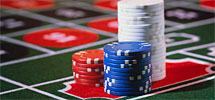Monte Carlo (Gambler's) Fallacy
Monte Carlo Fallacy, which is also referred to the Gambler’s Fallacy is a belief that likelihood of random events can be predicted or influenced by some other independent events. While some gamblers have relied on this fallacy to succeed in gambling, others term it as a misguided belief that holds no water. In a game of chance such as roulette, if a given outcome has not happened for a while, there is a high likelihood that this outcome will occur in the nearest future. For instance, let’s say that you have hit black in a streak of 6 times; chances are high that the next one must definitely be red.
Odds of Flipping a Coin
Another scenario where you can expect the concept of Monte Carlo Fallacy to work is flipping a coin. Let’s say that you have flipped a fair coin for ten times and all the tries have resulted in ‘heads’. You can expect that the next try must give you ‘tails’. But you should keep in mind that every coin flip made is independent from the other. Each time the odds of getting either a tail or head are the same at 50 percent for each of the two sides. The Monte Carlo Fallacy normally takes different forms. First, there is the concept of ‘run of good luck’. In this regard, a certain outcome in a random event has a high likelihood of occurring since it just happened recently.
Laws of Averages
The second form of Monte Carlo Fallacy is that there is a high likelihood of an outcome to occur as it hasn’t happened recently. This is at times known as the ‘laws of averages.’ As a gambler, you believe that it is your turn now and you must get your desired win. Similarly, there is a less chance of a certain outcome occurring as just happened recently; something most people say that the outcome has ‘exhausted its luck’. There is also the run of a bad luck where there is less chance of a given outcome occurring since it hasn’t happened recently.
Myth or Truth
It is not easy to tell whether the Monte Carlo Fallacy is a proven concept or just a myth. Arguments of people who believe, that this concept is a myth, is based on the fact that every spin in roulette and rolling of the dice is independent from any other roll or spin. In fact, there is an expression that ‘dice has no memory’. Also, in life the if something hasn’t happened in the past really doesn’t mean that it is going to happen in future.
There is nothing like an outcome in gambling being ‘overdue’ and regardless of previous outcomes, odds still remain the same and future outcomes can favor you or the house. Previous results in a game might not always affect the future outcome in a positive manner. Also, multiple tries in a game can boost your chances of getting the price. However, such chances lower with every failed roll as you effectively have less tries left.



